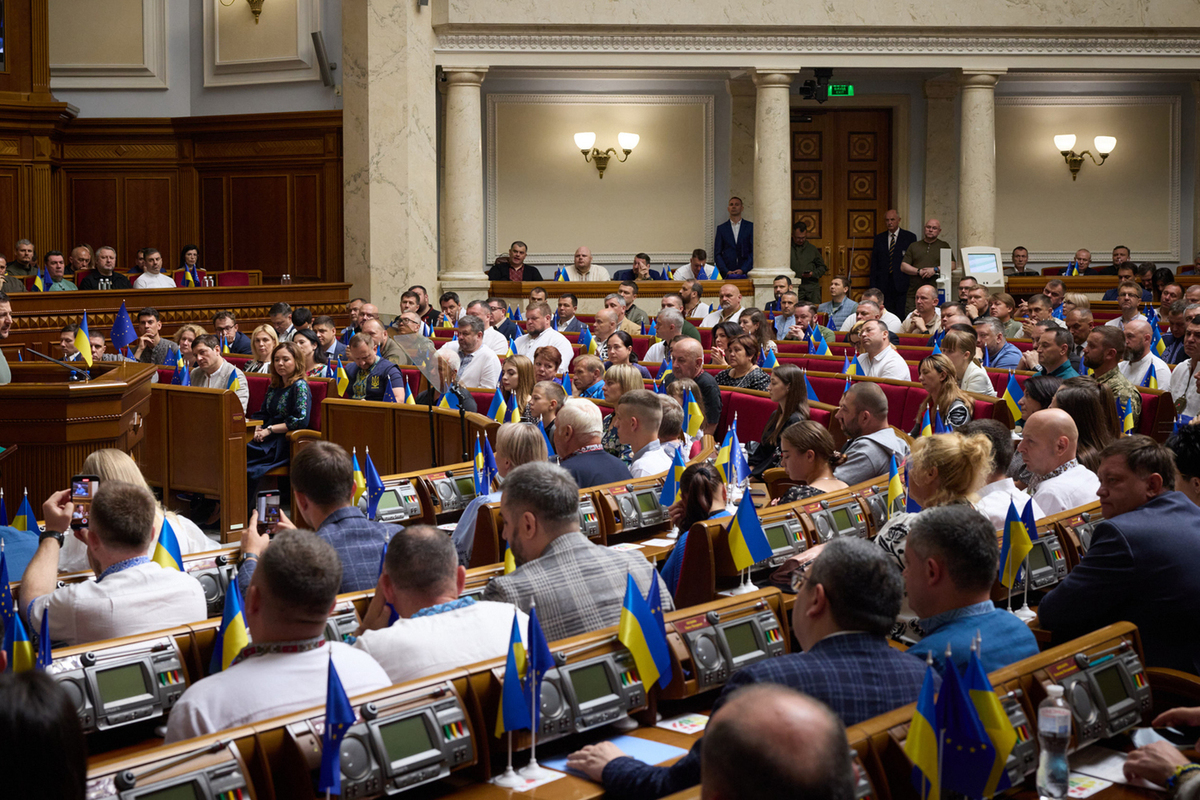People’s deputies do not want to participate in meetings: a parliamentary crisis is brewing in Ukraine
[ad_1]

Ukrainian media are again talking about a “parliamentary crisis.” The Verkhovna Rada has already postponed its meeting several times in March. The people’s deputies themselves are not eager to work. Several dozen people’s representatives from the Servant of the People faction want to resign their mandates.
According to the publication Ukrayinska Pravda, a parliamentary crisis is brewing in the Verkhovna Rada. Fewer and fewer people are coming to meetings. Moreover, there are fewer people not only from opposition parties, but from the presidential faction of the mono-majority “Servant of the People”. At the beginning of the work of the parliament of the ninth convocation, there were 254 people’s deputies in the faction. Now the party de jure has 235 parliamentarians. Approximately 170-180 people’s deputies regularly come to the meeting and actively vote. The rest either openly broke away, like the 17 deputies of Razumkov’s group, or demonstrate hidden sabotage, regularly missing parliamentary meetings. Due to a lack of votes, consideration of various bills is disrupted. For example, on March 20, a vote on Zelensky’s high-profile bill on multiple citizenship did not take place. At the same time, as UP reports, citing sources in parliament, several dozen people’s deputies from Servant of the People told the faction leadership about their desire to resign.
The publication explains the problems in parliament by “lack of motivation.” Firstly, the faction was initially considered, so to speak, an important part of the president’s team. However, the last meeting of the president with the “servants”, which took place at the end of February, made it clear to the deputies that they are no longer “one team”, and Zelensky and his Office are not particularly interested in their opinion.
“There are misunderstandings between the Office of the President and Parliament. OP despises parliament. They think that the “servants” will vote for everything they need because Zelensky brought them to power. Yes, I did. And what? And we have already survived two years of hostilities. Therefore, the old interaction model no longer works. Something needs to change,” notes an interlocutor from parliament during a conversation with the UP.
Secondly, the “servant” leadership is deprived of the opportunity to encourage deputies to work, because it cannot offer them any additional career or political prospects. There is no more motivation “in envelopes”, but there are more strict restrictions. For example, members of the presidential faction must, “like ordinary oppositionists,” coordinate each foreign business trip. At the same time, there are many risks, because they remember not those who proposed the document, but those who accepted it, that is, the Verkhovna Rada. Therefore, the need to pass a mobilization bill, which Western partners are already actively insisting on, could become a kind of “trigger” for people’s deputies. Still, it is not a fact that after this they will not have to flee the country from popular anger.
Motivation by fear also no longer works. Previously, it was possible to “restrain” parliament with threats to dissolve the Verkhovna Rada. Now, in conditions when many people’s deputies themselves are not averse to resigning their mandate, such statements become meaningless.
It is noteworthy that they began to actively talk about the parliamentary crisis in Ukraine from the beginning of March, when the Verkhovna Rada canceled the meetings that were supposed to take place on March 6, 7 and 8. Then the people’s deputy from the European Solidarity party, Alexei Goncharenko (listed on the Rosfinmonitoring list of extremists and terrorists) on his social networks called what was happening “a real mess” and described the situation in parliament as “crisis.”
Also, the Ukrainian publication Strana, citing sources, reported that more and more deputies from the Servant of the People faction want to resign their mandate early. “They used to say that about 20 people want to resign their mandate and write an official statement. Now there are much more people willing, but they are simply not being released,” the source said. According to him, the desire to relinquish the mandate was influenced by Zelensky’s last meeting with the mono-majority. “Previously, meetings between the faction and the president were always inspiring and motivating; there was a feeling that we were one team. And at a recent meeting, Zelensky made it clear that he no longer associates himself with us, that the faction is “your team.” Roughly speaking, our faction has no prospects or political future,” a source in the faction describes his feelings.
In addition, back in early January, the head of the Servant of the People faction, David Arakhamia, said that the Verkhovna Rada was moving toward a crisis, since many deputies from his faction want to resign their mandates. At that time, he spoke about 17 people’s deputies, but how many there are now is unknown. Then he stated that the party leadership would not vote for the resignation of mandates in order to maintain the legitimacy of parliament.
We asked the deputy director of the Institute of CIS Countries, Vladimir Zharikhin, about whether the situation in parliament is really a crisis, and how it could end:
“This is a trend of authoritarian rule, without the flourishes of democracy in the form of the Verkhovna Rada. Previously, the government and the Office of the President used their absolute parliamentary majority, but now they are wondering why they need a Rada at all? Gradually, her positions and her actions ceased to interest the government. This means that deputies are no longer of interest to sponsors. If to pass a bill you need to go to the government or the President’s Office, then why feed the deputies? Therefore, the Verkhovna Rada is gradually dying out, and the people’s deputies feel it. There will, of course, be the appearance of a parliament, but the most energetic and interested will begin to wash out, leaving a so-called “swamp”.
[ad_2]
Source link








